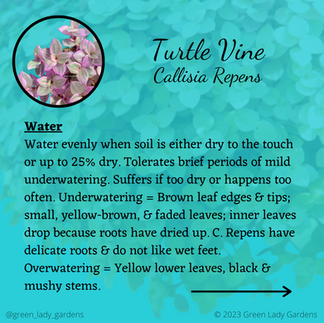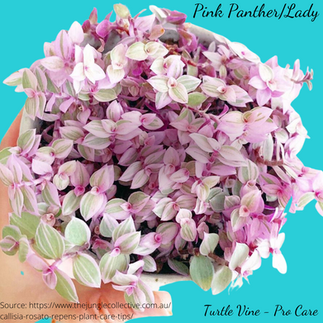Many people refer to turtle vine as Tradescantia but turtle vine are actually part of the Callisia genre. Both genre are part of the Commelinaceae family. (Taxanomic tree: family > genre > species.) While the care of these genre is similar, Callisia have slightly higher water and light needs. It's important to treat them as the separate genre that they are if you want your turtle vine to look it's best. The 'Bianca' and 'Pink Panther'/'Pink Lady' varieties are particularly sensitive to light levels because they are highly variegated. Callisia repens 'Green' are the only naturally occurring variety.
Save this slideshow from our Instagram page and easily share it with others
Water
Water evenly when soil is either dry to the touch or up to 25% dry. Tolerates brief periods of mild underwatering. Suffers if too dry or happens too often. Underwatering = Brown leaf edges & tips; small, yellow-brown, & faded leaves; inner leaves drop because roots have dried up. C. repens have delicate roots & do not like wet feet. Overwatering = Yellow lower leaves, black & mushy stems.
Light
Bright indirect to maintain color & variegation. A few hours of direct from an east or ground level west window is ok. Too much = Leaves yellow before fading & crisping. Too low = Leaves lose variegation, drop, are leggy.
Humidity
Average household humidity is fine. Beneficial if soil dries too fast or often.
Soil & Repotting
Use a well-draining peat-heavy potting soil. Soil that is too chunky = Hard for roots to take hold. A pot with drainage is important to water thoroughly & avoid wet feet. Delicate roots mean C. repens can go many years in the same pot.
Temperature
60-80°F. Higher temps = More frequent watering.
Pruning
Fast grower! Prune green growth to promote variegated leaf growth & to keep plant bushy.
Propagation
Very easy to propagate in water or soil.























Comments